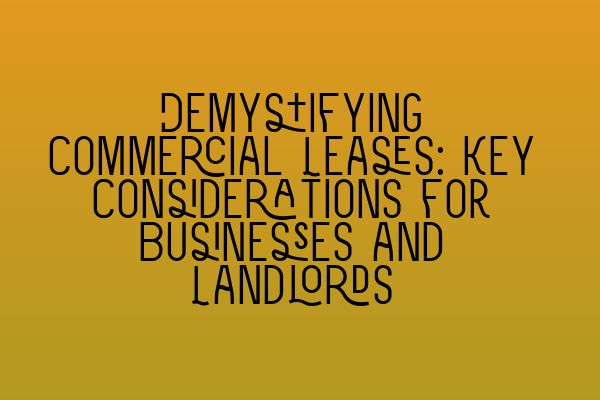Demystifying Commercial Leases: Key Considerations for Businesses and Landlords
When it comes to commercial leases, businesses and landlords can often find themselves overwhelmed by the complex legalities and jargon associated with these agreements. However, understanding the key considerations is crucial for ensuring a smooth and successful lease transaction. In this blog post, we aim to demystify commercial leases and provide valuable insights for both businesses and landlords.
1. The Basics of a Commercial Lease
A commercial lease is a legally binding agreement between a landlord and a business, outlining the terms and conditions under which the business can occupy and utilize the leased premises for commercial purposes. It is important to note that a commercial lease differs significantly from a residential lease in terms of its complexity and legal implications.
Before jumping into the details, it is imperative for both parties to clearly define their expectations and negotiate a fair and balanced agreement. Hiring an experienced solicitor who specializes in property law, such as SQE Property Law & Land Law, can provide valuable advice and guidance throughout the lease negotiation process.
2. Duration and Renewal
One of the first considerations in a commercial lease is the duration of the lease. The duration is typically expressed in years, with the option for renewal. It is crucial for businesses to carefully assess their long-term needs and align the lease duration accordingly. Landlords, on the other hand, need to evaluate the financial stability and growth potential of the business to make an informed decision on lease renewal.
Considering the long-term nature of commercial leases, it is essential for both parties to anticipate potential changes in circumstances and include appropriate provisions for early termination or assignment of the lease. Seeking legal advice from SQE Property Law & Land Law can help ensure these provisions are adequately addressed.
3. Rent and Service Charges
Rent is a fundamental aspect of any commercial lease. It is important for both parties to clearly define the rent amount, payment schedule, and any provisions for rent increases over the lease term. Rent reviews are typically conducted at predefined intervals, and it is advisable to consult legal experts, like SQE Property Law & Land Law, to navigate this process and ensure fairness and compliance.
In addition to rent, businesses may be responsible for paying service charges, which cover maintenance, repair, and other expenses associated with the leased premises. It is crucial for businesses to understand the scope of these charges and negotiate reasonable caps, as excessive service charges can significantly impact their bottom line.
4. Repair and Maintenance Obligations
Commercial leases often specify the repair and maintenance obligations of both parties. Landlords typically have a responsibility to maintain the structural integrity of the building, while tenants are responsible for keeping the leased premises in good condition. It is advisable for businesses to inspect the premises thoroughly before signing the lease and document any existing damage or issues to avoid disputes in the future.
Furthermore, businesses should consider negotiating a break clause within the lease, which allows for termination under certain conditions, such as ongoing repair or maintenance issues. Again, seeking legal advice from specialists such as SQE Property Law & Land Law can be highly beneficial in ensuring the inclusion of fair and comprehensive break clauses.
5. Use and Alteration of Premises
Commercial leases outline the permitted use of the premises, and businesses should carefully review these provisions to ensure they align with their intended commercial activities. Certain businesses may require specific permissions or licenses, which need to be discussed and agreed upon with the landlord prior to signing the lease.
Additionally, businesses may desire to make alterations or improvements to the leased premises to suit their specific needs. Lease agreements typically address this by specifying whether alterations are allowed, subject to landlord’s consent, and under what conditions. It is crucial for businesses to comply with these provisions and seek legal advice to navigate the process smoothly.
In conclusion, commercial leases can be complex and overwhelming, but understanding the key considerations is essential for businesses and landlords to enter into a successful agreement. By seeking legal advice from specialists, like SQE Property Law & Land Law, businesses and landlords can navigate the complexities of commercial leases with confidence and ensure their interests are protected.
If you are looking for further guidance on legal aspects of property law or preparing for the SQE exams, SQE 1 Practice Exam Questions and SQE 2 Preparation Courses provided by SQE Property Law & Land Law can serve as valuable resources. Stay updated with the latest SQE exam dates by referring to the SRA SQE Exam Dates page.
Remember, commercial leases are a critical aspect of any business operation, so it is essential to approach them with due diligence and seek professional advice to achieve the best possible outcomes.
